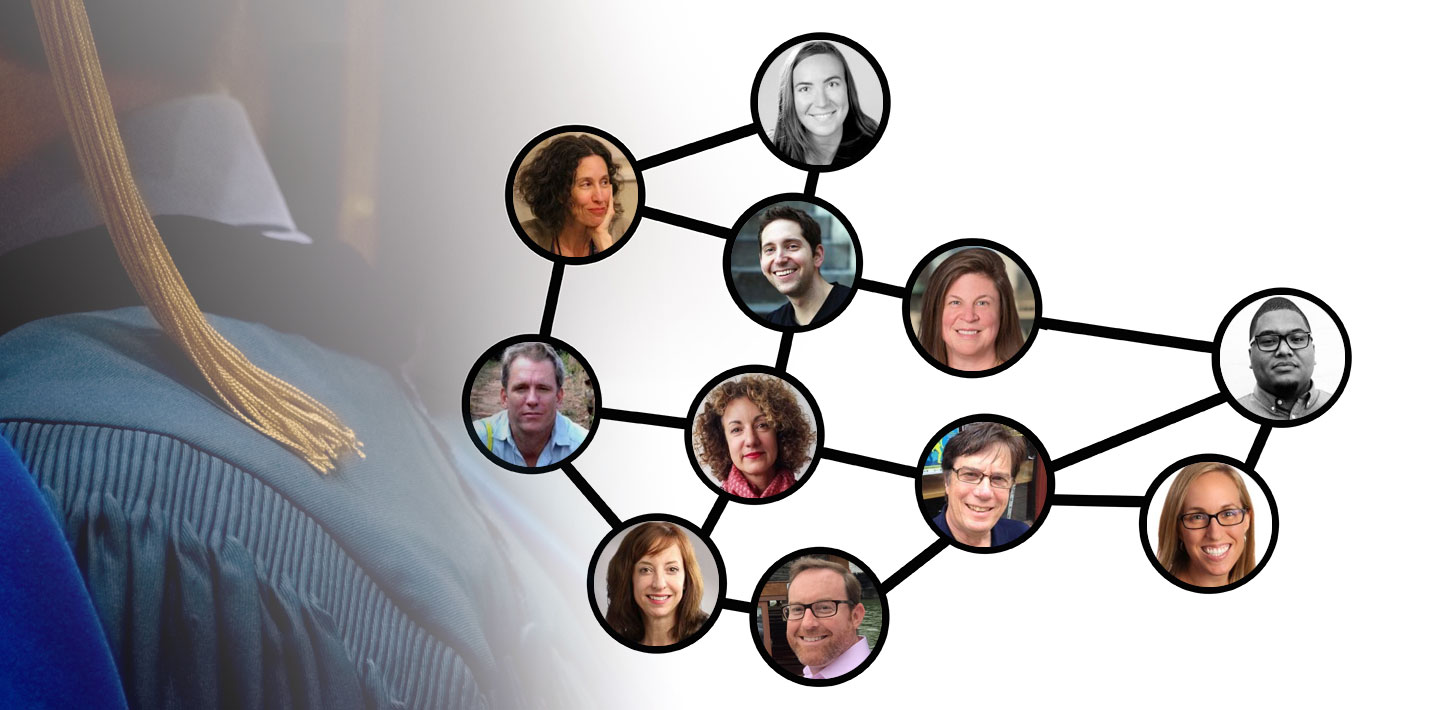By Maria LaMonaca Wisdom

How does a humanities Ph.D. end up working outside the academy?
While finishing her dissertation, Jennifer Gilbert (Ph.D.’99 History) sought a job that “wasn’t waiting tables.” She signed up with a temp firm and got placed in an administrative support position with a Boston bank. When the bank acquired another bank branch in a historic neighborhood, Jennifer offered to put her Ph.D. training to work, writing a history of the newly acquired bank.
The rest wasn’t exactly history, but it did launch Jennifer on her banking and marketing career. Today, she is senior vice president of marketing at Jemison Associates.
The transition to a career beyond academia wasn’t as smooth for everyone. Deborah Chay (Ph.D.’92 Literature), now a management consultant, reported that “it took her years” before she could even imagine the possibility of moving away from what many would consider a dream tenure-track faculty position at Dartmouth. Back in the 90s, leaving the academy was so unthinkable that Deborah and an equally restless colleague would “go to the next town” to hold confidential discussions about escape strategies.
As these two vignettes suggest, no two humanities Ph.D.s are alike, and career paths differ for everyone. For this reason, humanities doctoral students might find informational interviews with Ph.D. alumni to be especially valuable. To help you with this and to help make career paths for humanities Ph.D. more visible, Versatile Humanists at Duke collected information on the nonacademic career paths of over five dozen Duke Ph.D. alumni last year. Approximately 20 alumni made time to chat with me on the phone, and more than half of those are now featured on the new VH@Duke humanities alumni directory.
All the alumni on the directory have expressed a willingness to talk with current Duke humanities Ph.D. students about their industries and career paths. I encourage you to browse the directory and reach out to anyone you’d like to learn more about. In the meantime, here are my own takeaways from a set of conversations with a fascinating and diverse group of humanists working beyond the academy.
Careers of their own choosing: While some Ph.D.s pursue nonacademic work out of necessity, many alumni have freely and happily chosen to step outside the academy. Many of the alumni I spoke with report feeling passionate about their research interests, but nonplussed about an academic culture they perceived as isolating, insular, and (far too frequently) toxic. “I just couldn’t stand faculty meetings,” one of them confided, “no matter what you talk about, nothing happens.”
On the plus side, alumni cited geographical mobility, opportunities for broader social impact, more consistent interaction with other people, and (in some industries) more control over defining professional roles as welcome benefits of working beyond the academy.
To thine own self be true: Related to choices and benefits, a resounding theme of the conversations is that professional pathways open up as a result of persistence and (most critically) self-knowledge. For example, Nick Dobelbower, a Ph.D. in Romance studies now managing a team of international benefits consultants, stressed that graduate students should pursue careers in academia out of a genuine interest in faculty roles, rather than a need to “prove oneself” as an intellectual. Is a lifetime in academia right for you? Or are there personal values (such as choosing where you want to live) that trump what the academy tells you to value (academic prestige, tenure)?
“A Ph.D. is special”: Alumni confirmed that advanced training in the humanities confers a number of professional advantages, even beyond the academy. According to Gilbert, in her professional circle, “M.B.A.s are a dime a dozen, but a Ph.D. is special.” Another Duke Ph.D. in history, Tom Hatley, said that in his industry (environmental consulting), it doesn’t take him long “to scratch and find out that someone has a Ph.D .… They are people who connect and absorb stuff and see the big picture.”
Learning doesn’t stop with that degree: Transferable skills notwithstanding, humanities Ph.D.s can expect some degree of a learning curve after leaving academia. More than one Ph.D. graduate underscored the importance of soft skills that aren’t taught in Ph.D. programs: an ability to understand and work with different personalities, negotiation and mediation skills, leadership training, and a grasp of organizational development. People write and communicate differently in the business world, and decisions are made quickly, with an emphasis on concrete problem-solving.
Look beyond obvious options: As I survey all the information I’ve compiled on Duke humanities Ph.D.s thus far, what strikes me most is how the variety of professional trajectories defies assumptions and stereotypes. Ph.D. students who investigate careers beyond academia typically research fields that in some way resemble academia—museums, libraries, publishers, nonprofits, the arts—and Duke humanities Ph.D.s in these fields are well represented. Yet a significant number of Duke alumni have flourished in fields that we don’t typically associate with “humanities” careers: technology, finance, innovation and entrepreneurship, and even engineering.
Barriers to entry in more specialized fields are higher now, as alumni were quick to point out. For some, it was partly a matter of being in the right place at the right time. But being in the right place at the right time doesn’t happen by accident. Building your professional network is where it begins. Consider reaching out to a Duke humanities Ph.D. alumni today!
